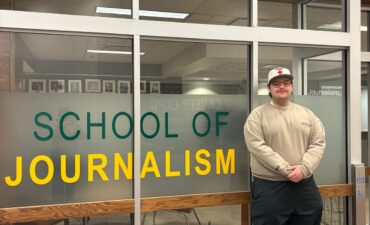It took Dan Yates six months to convince his wife Louise Yates to sell their Regina house and move into a mobile home in Kronau, where they run K-Lane Kennels and do beekeeping as a hobby.
“I boarded our little dog, Daisy, here for a weekend,” said Dan, recalling his initial interest in K-Lane 19 years ago.
“And when I came to pick her up there was a ‘For Sale’ sign.”
Dan was a door-to-door milkman at the time, before taking a leap of faith and buying K-Lane Kennels.
K-Lane Kennels was opened in 1992 and operated by its original owners before Dan and Louise bought it in 2002 and moved to the trailer that was attached to the business. Dan quit his job after the couple moved outside Regina, but Louise kept working on her corporate job for four more years. The couple then expanded the kennel and built a house next to it for themselves.
“I can’t imagine having a kennel building not located at my home,” said Louise, explaining if there is an emergency, they will be able to tend to the dogs immediately.

With their house next to the kennel, Dan and Louise are working more than 14 hours a day. When asked how they deal with the exhaustion, Louise said, “If you gonna have a job this is the best job to have, I just love it”.
She added there is always a layer of stress because they are constantly worrying about the well-being of the dogs, but they love dogs and working with them. But it’s not just about dogs.
Louise started beekeeping as a hobby in 2016 with only one hive. She attended classes and became a certified beekeeper. Now Louise has 21 hives, a honey house and a licensed extraction area.
Louise’s product is called “Living Sky Honey” and was chosen as a finalist in the 2019 World’s Best Tasting Honey Competition.
Louise never intended her beekeeping hobby to turn into a business.
“Originally when I started the honey, I would just put it in the kennel,” said Louise.
Since she had few hives at that time the kennel customers would buy all the honey.
As Louise expanded her hives fewer customers came by the kennel due to COVID-19, so she started selling the honey to local retailers.

Although the kennel and the bees take up most of Dan and Louise’s time, they are not the only things the couple focuses on. Louise is a “Missing Animal Response Network” pet detective who is trained to recover lost pets. She is also an animal welfare lobbyist and part of the Regina Humane Society’s fundraising committee.
Louise has written two E-books on beekeeping. Your First Hive Inspection: Looking for Normal and Honey Bee Diseases and Pests Looking for and identifying anything not normal are available free of charge on the Regina & District Bee Club website. www.reginabeeclub.ca
Louise’s books are a guide for beginner Saskatchewan beekeepers.
“Beekeeping in Africa and Florida is different from beekeeping here because they don’t get -40, so my books are for beekeeping here.” said Louise.

Dan and Louise’s dedication and love for the environment doesn’t conclude with beekeeping. The acreage they run their business on and live in uses 100 per cent renewable energy.
“We’ve always been interested in environmentally friendly stuff,” said Dan. “I think part of that comes from growing up on a farm.”
They installed a geothermal earth heating system for the kennel when they were expanding in 2008.
“Because we had the geothermal then the electric bill went up because of the heat pumps so we were like how do we get those electrical bills down? Solar?” said Louise.
They installed a 48-kilowatt, 192-panel solar farm to generate the electricity they needed. And they are now 100 per cent green.
“You have to look at its long-term effects,” said Louise. “If you are going to be in your location for 20 years it absolutely makes sense because there is a payback time at some point.”
Dan mentioned they eventually might have to move after retiring and closing the kennel.
Until that time comes, they might put the bees in the kennel and continue their beekeeping hobby. “As much as we love looking after dogs, I don’t think I want to do it when I’m 79.” said Dan while laughing.
“Selling the kennel would be problematic…it would mean selling the house and we love living here.”












